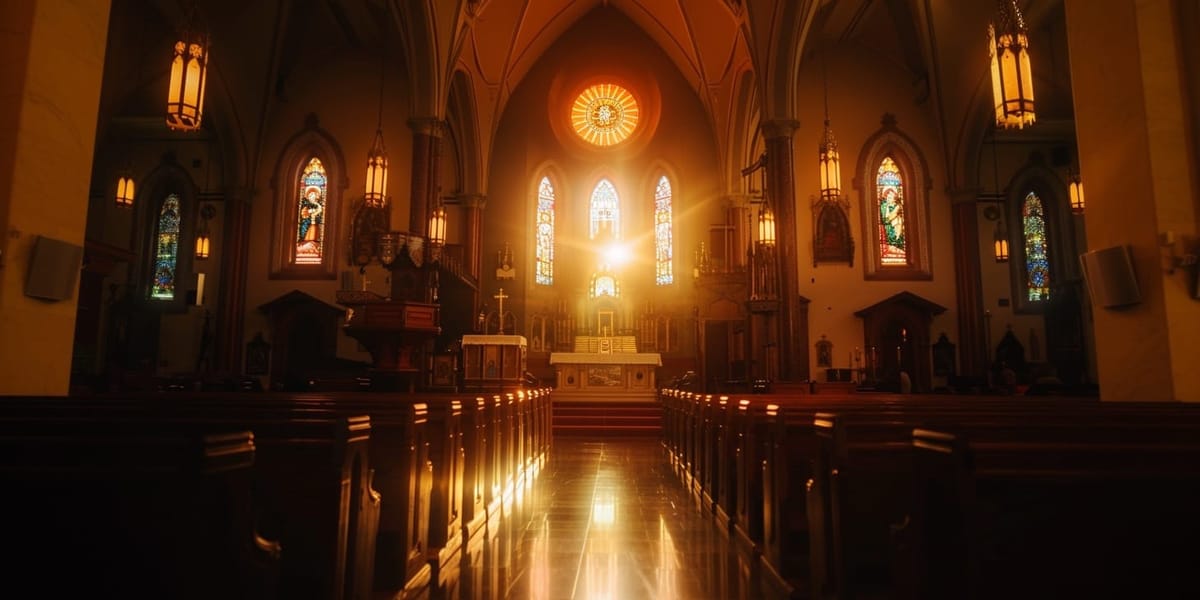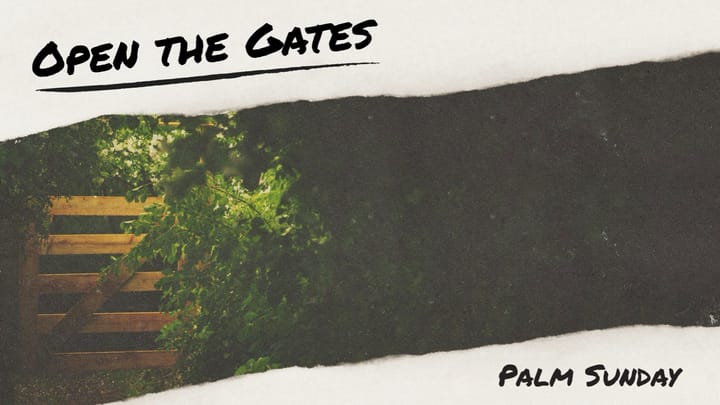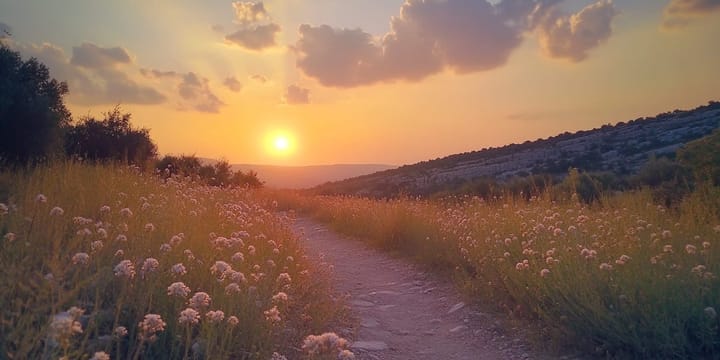Fairhaven Sermon 5-26-2024
Rev. Dylan Parson's sermon highlights God's awe-inspiring holiness and the need for repentance. Using the story of Uzzah and reflections on Isaiah and John Wesley, he urges the congregation to embrace God's transforming holiness and fully commit to a life of faith and purity.

In this week's sermon delivered by Rev. Dylan Parson at Fairhaven United Methodist Church focuses on the profound concept of holiness and how it is often overlooked in modern times. Rev. Parson begins by explaining that holiness means being set apart and emphasizes God's pure holiness, which is awe-inspiring and fearsome. He illustrates this with the story of Uzzah from 2 Samuel, who was struck dead for touching the Ark of the Covenant, a representation of God's tangible presence. Rev. Parson suggests that our casual and informal culture has led to a diminished sense of God's holiness, which is essential for true worship and understanding of God's nature.
Rev. Parson also reflects on the transformative experiences of Isaiah and John Wesley. Isaiah's vision of God's overwhelming holiness in the temple revealed his own and his people's sinfulness, while Wesley's heart was "strangely warmed" during a Bible study, marking his conversion and the start of his evangelistic ministry. The sermon emphasizes that true conversion involves a continuous process of repentance and striving for holiness. Rev. Parson concludes by inviting the congregation to embrace God's transforming holiness, moving beyond being "almost Christians" to fully committing to a life of faith and purification.
Transcript
So what is holiness? The angels are singing Holy, holy, holy. What is holiness? Do you know? And I'm concerned that we've lost a lot of our capacity to understand exactly what that is in our modern world. The most basic definition of holiness is set-apartness, something that's completely different than, that's elevated from the everyday. And so of course the most holy thing, most holy period is God, who is pure holiness.
He's both in the midst of creation and beyond and bigger than creation. He's bigger than time or space or human understanding. Holiness is something that's kind of awe-inducing whenever you encounter it. And it can be awe-inducing to the point where it's kind of fearful, fearsome.
I think of the story in 2 Samuel. You don't read this one in the lectionary that I can think of, but in 2 Samuel, the Ark of the Covenant, which is the tangible presence of God among the people. God is somehow there in that box. The Ark of the Covenant is being moved in 2 Samuel from its previous home in Keraph Jerim to Mount Zion.
And so as it's being transported by ox cart up the road, that's the equivalent of a tractor trailer back then, right? It wobbled and one of the Israelites who's helping to move it, Uzzah is his name, he reflexively reaches out to steady it so it won't tip. He reaches out to hold it up and he's struck dead in an instant because he has touched the presence of God, pure holiness. It's like grabbing onto a power line to touch God's pure holiness. And again, I'm not really sure if we can get what this means in our time and our place.
We're a deeply casual and informal culture. And this is a good thing in many ways. You know, I'm glad that we're friends, that we're children of God. We've been given through Jesus Christ the intimate relationship of adoption as God's children.
I'm also glad that we don't mostly think anymore that, you know, wearing a nice hat or a tie to church or this looking good and put together is a mark of Christian faithfulness. We've gotten past that for the most part and that's a good thing. But perhaps a trade-off with our informality is we've largely lost a sense of holiness. And I would say it's important that we develop one if we're to know and worship God who is holy.
We read about the fear of God throughout Scripture. And the fear of God, you know, that doesn't mean that we're supposed to live in like teeth chattering terror of what God's going to do to us if we sin. That's not what that's about either. God's gracious, God's merciful, God is love above all.
But still, to have a healthy fear of God does mean that we should have a sense of God's magnitude, God's glory, and that ought to shape how we behave, how we relate to God, how we relate to ourselves and each other. For whatever reason, the opening of Isaiah chapter 6 always catches me. In the year of King Isaiah's death, I saw the Lord sitting on a high and exalted throne, the edge of his robe filling the temple. We think we're about to get this kind of historical report from the prophet.
In the year in which Isaiah died, you think you're going to hear something about, you know, what was happening in politics, in war, whatever. No. The screen flashes to black and instead we're just transported within a sentence to another realm entirely. We're no longer on earth.
We're no longer amidst human civilization in ancient Israel or modern America, but we're in the very throne room of God Almighty. And the Lord sits on a throne high and exalted. But the size of God, if such a thing can even be imagined, is unimaginable, right? God doesn't have a size. So the hem of God's robe fills the grand Jerusalem temple.
That's what Isaiah is seeing. God's robe, the corner of his robe is filling up the temple. And God's glory is too much even for the angels to look at. They're flocking around the throne, they're flying, they're singing all around God, but they keep their faces covered with one set of their wings so that they don't look at God directly.
They can't. And they sing, Holy, holy, holy is the Lord of heavenly forces. All the earth is full of God's glory. Those of you who might have a Catholic background, these are familiar words in Latin.
Sanctus, sanctus, sanctus. Dominis Deus Saba, ot plenis uncelea terra et gloria tua. We've heard these words in choral pieces for a thousand years. These are the words that have been used in Christian worship since the very beginning.
We still use them at the communion table as we sing the unending hymn of the angels, right? God's glory is being proclaimed by these angels without ceasing from the beginning of time to the other side of time. And all the while, Isaiah describes that the doorframe of this throne room, the doorframe of the temple is shaking like an earthquake, and the place is filled with smoke. The whole place is full of smoke. And Isaiah finds himself in the midst of this.
He was here out of nowhere. And he essentially collapses in terror as he somehow finds himself standing in front of God. As far as he's concerned, seeing God is as much of a death sentence for him as it was for that servant Uzzah in 2 Samuel. And so the first thing that Isaiah feels that he's aware of is his sin, his peoples.
That's what God reveals to him first. Whenever you see the holiness of God, you see the unholiness of you. And so Isaiah, he just shouts out, Mourn for me, for I am ruined. I have seen the King, the Lord of heavenly forces.
Coming into contact with pure holiness reveals our sin the same way, you know, like a blacklight will reveal fingerprints. And Isaiah is conscious not only of his own sin, but also that his whole people are swimming in a sea of it. It's not just that he is a sinner, but that's all he knows. All his people do is sin, like ours, right? And that's important because sin is always both an individual thing, Isaiah is aware of his, but it's also something that we do together.
We participate in it together. We prod and enable each other in our sin until we are a people of unclean lips. But Isaiah is this prophetic soul. He's much more sensitive to that than you or I could be.
And he's overcome by the contrast, the weight of sin that's inside him, that's hanging onto him versus right there, the untouchable holiness of God. The contrast is too much for him. And as I tried to imagine what this must feel like for Isaiah, the only image that came to mind was a moment in which human beings found themselves closer to touching the power of God than they ever had in history. The only image that came to mind was the ironically named Trinity Test on July 16th, 1945, the first ever atomic bomb detonation.
I think that would have been a comparable image in the desert of New Mexico. So I was reading some accounts of that first test. And this is the words of Joan Hinton. She was a nuclear physicist who worked on the Manhattan Project.
She was 25 miles away from the bomb when it went off. And this is what she writes. It was like being at the bottom of an ocean of light. We were bathed in it from all directions.
The light withdrew into the bomb as if the bomb sucked it up. And then it turned purple and blue and went up and up and up and up. We were still talking in whispers when the cloud reached the level where it struck by the rising sunlight so it cleared out the natural clouds. And we saw a cloud that was dark and red at the bottom and daylight at the top.
And then suddenly the sound reached us. It was very sharp and rumbled and all the mountains were rumbling with it. We suddenly started talking out loud and felt exposed to the whole world. Joan Hinton, like many others who were present that day, found her life was completely changed from that moment forward.
Upon hearing about the nuclear bombs that were dropped on Hiroshima and Nagasaki, she resigned from the Manhattan Project. A few years later, she left the U.S. for the rest of her life in the horror of the Cold War, the prospect of using nuclear bombs again.
And before long, she'd given up physics. She wasn't a physicist anymore. And she worked on farms. She worked in agriculture for the rest of her life.
Now this is not exactly the same thing. Of course, the glory of God is not like a nuclear bomb, but it is. The point is that encountering God is brushing up against a pure holiness that we can't understand. We can't really process it.
And that inevitably has a real effect on us. Getting near God is getting close to something powerful beyond our understanding. The holiness and the majesty of God do something to us as we face down a power that no nuclear physicist could imagine. It changes us.
And of course, we can retreat from God. We can choose to do that. We can do our best to keep our distance, though God will continue to pursue us in grace. The other choice is this.
We can draw nearer, but again comes change. You have to change, whether you run away or go forward. We got to go into repentance, followed by the ongoing process of perfection as we get closer and closer to God. One of Wesley's signature teachings was perfection, that we are getting better and better, closer and closer to the image of God, the more we work and let the spirit work within us.
And this perfection is the burning coal with which the angel touches Isaiah's lips. God's holiness functions kind of like the smelting fires of a steel mill. Nothing can come out unchanged. Impurities are burned away.
The heart is purified. And this is what we're signing up for if we decide to walk toward the throne rather than run away from what we've seen. The same way being born again or born from above, as Jesus tells Nicodemus, everyone has to be is launching or at least taking baby steps into a new life after encountering God's holiness and grace. So as Isaiah stands before God in the hovering seraphim with all their wings, their faces covered, as Nicodemus listens to Jesus, both of them are totally lost.
They're confused, right? None of this makes sense to them. Not that it really does to us. And all they can do is turn toward God in puzzlement. They see that it's good that they're here.
They know there is something to be taken from this, and they just move forward with God, not really understanding it at all. Because what they have is an openness to God's work of purification, God's work of renewal. They decide to be part of it. God has shown up in a mighty way.
And the rest of Isaiah's and Nicodemus' lives have been shifted like they got hit by a nuclear shockwave. Their lives completely go the other direction from where they were. Today, as I mentioned earlier, is Aldersgate Sunday. So earlier you heard John Wesley's journal entry from that evening, May 24th, 1738, about how he went down to London's Aldersgate Street.
He says, Very unwillingly, he writes, and he went for a Bible study. He went to listen to a Bible study with the Moravian people, and he noticed in the middle of it, while he was listening to an introduction to Romans by Martin Luther, so like riveting stuff, right? And in the middle of that, his heart is strangely warmed by God. Something happens. He perceives that something has shifted.
And Aldersgate is a moment like the one that Nicodemus and Isaiah experience. Somehow, and for some reason, the glory of God appeared to Wesley in a way that he couldn't help but respond to. God showed up, and Wesley had to do something, and everything changed. So there's this spark that has been going in Wesley's heart his whole life.
He's 35 at this time. And finally, that spark of grace that God had left in there catches. And all of this is after years of his being what he describes as an almost Christian, which is crazy for us to think about, because he was way more of a Christian than you are or I am now, but he'd been an almost Christian for his whole life. And he lived like one.
He was, you know, he behaved in charitable ways. He reached out to people in love. He was very generous. He prayed.
But with all of that, he never felt the depth of love Jesus had for him, for all people. He never felt confidence that God really loved him, that he was saved, that he was redeemed in that love. But in that moment in Aldersgate, he finally felt it. He'd already been a priest in the Church of England for years.
He'd already spent two years overseas in Savannah. He was the missionary who was personally selected by the founder of Georgia to establish the church in that colony. He's a big deal already. But here, at this Bible study, for some reason, he finds himself shaken to his core in the best way possible.
He sees God face to face in a way that he never had previously, and everything changes as his faith works his way down into his heart. And this, you can argue, is the moment that marks his entry into his evangelistic ministry. He was a pastor. He was a priest, a scholar before, but he enters into something new.
And this is the ministry that will change the world. This is the ministry that we inherit. We're here because of the preachers that he sent out, out of that warmed heart, all the way to the frontier of Pennsylvania, right? And amazingly, Aldersgate happened just weeks, it might have been even days, after his brother Charles had the same experience. Both of these men found their lives turned upside down by the Spirit in May of 1738, and things change.
And from this point on, this is important. You have to remember that pretty much the Wesley's entire ministry was to people who were already Christians. He wasn't going out to try to like Christianize the natives in America or in Asia or something like that. His ministry was to people who already considered themselves to be Christians.
So nearly every person that John's preaching or Charles Hymns helped to convert was somebody who was already baptized. They were quite possibly at least an occasional church goer. And again, Wesley himself was extremely religious, long before he felt himself converted at Aldersgate. The man was a priest.
Nicodemus and Isaiah in the same way, they knew God before they met God in the way that would turn their lives upside down. They knew who God was, they believed, right? But Wesley's ministry was revolutionized in that moment to introduce almost Christians, like he had been, to God's holiness. That fiery mystery that purifies and transforms the heart if we dare to stop resisting and move closer instead. Now a problem with Aldersgate and the way that we often talk about it when it's talked about is that we act like it was this flash moment where just Wesley turned on his head, never sinned again, everything was just perfect from there and everything caught on fire.
That's not exactly what happened. I don't want to act like conversion happens in a flash that we're good for life after a warm and cozy moment. No, it's a daily commitment, a recommitment to keep walking towards God. And beyond that, not everybody gets this dramatic mountaintop experience, though many of us do.
Some of us never will. And most of us won't get to catch a glimpse of the heavenly throne room of God like Isaiah did, not in this life. But Wesley and the prophet invite us to examine whether or not right now, this regular morning, we are on fire with God's holiness, whether we're repentant of our sins, whether we're in the process of being perfected and purified like precious metal. Or are we just almost Christians going through the motions with a little love for God, no fear of God, just believe almost.
The good news is the burning holiness of God lies before us this day and every day beyond our imagining, but reaching out to every one of us. I assure you, Jesus tells Nicodemus, unless someone is born anew, it's not possible to see God's kingdom. But by water and the spirit, Jesus has made that possible. God didn't send his son into the world to judge the world, but the world might be saved through him, Jesus assures Nicodemus and tells us.
The invitation then is before us. The invitation is ours to decide whether we're willing to be converted from the ground up or whether almost is good enough. We can be converted, whether it's for the first time or once more. It happens over and over again sometimes as we shake off being almost Christians and embrace God's transforming holiness.
The name of the Father and the Son and the Holy Spirit. Amen.


